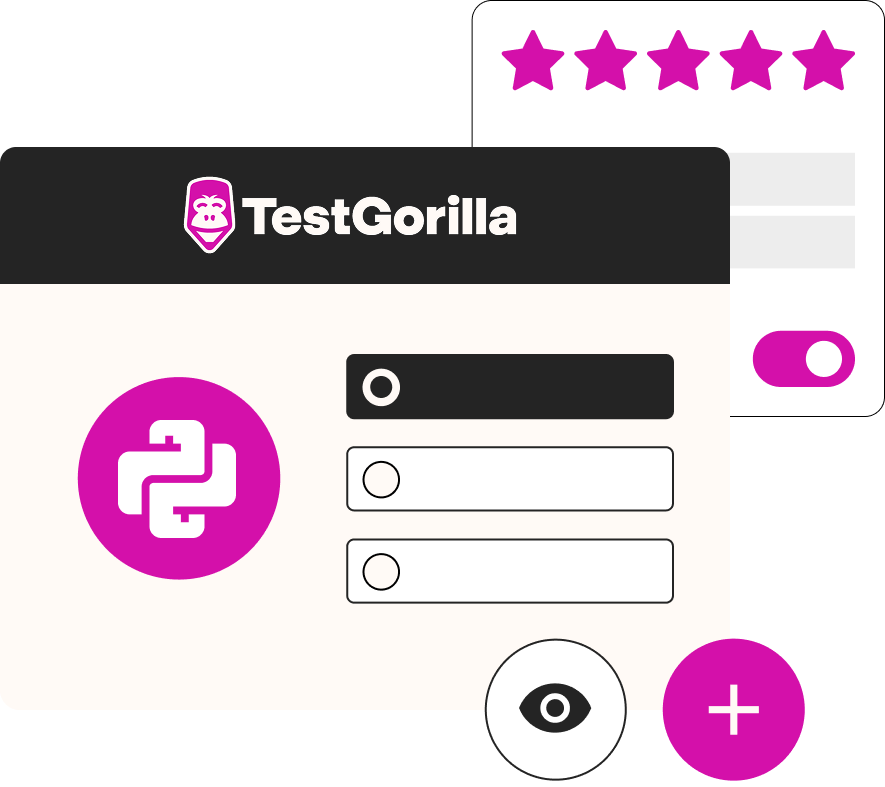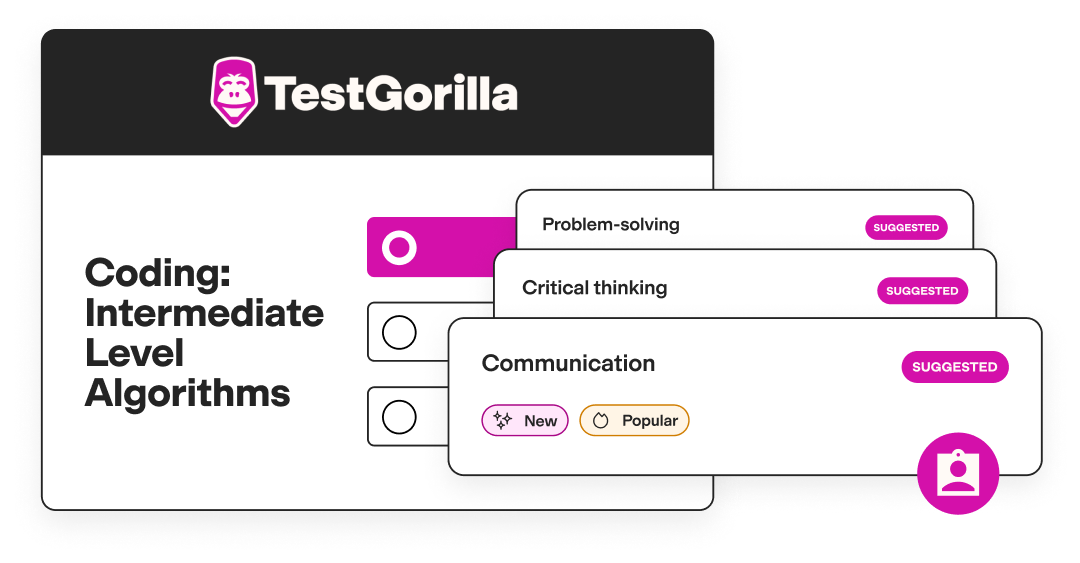Python coding tests
Looking to hire Python developers? Make sure your candidates possess the skills to fully unlock the code’s potential – along with strong general coding abilities, from problem-solving to debugging.
TestGorilla’s 12 universal coding tests can assess your applicants’ coding abilities in up to 20 languages, including Python. This helps you spot and hire developers who can solve complex problems, create reliable code, keep up with your project timelines, and more.
What is a Python skills test?
Python is an interpreted language that’s been around since 1991. It's widely used, flexible, and celebrated for its straightforward syntax and versatility. It has various uses, including creating web applications, handling big data, performing mathematical operations, and developing software. When you’re screening Python developer candidates, their resumes might tell you if they’ve used Python and other programming languages – but resumes can’t give you a reliable understanding of how strong their practical skills are.
Python skills tests can help. These are developed by experts who know exactly which skills are needed for success in developer roles. They assess proficiency in key areas like algorithms, hash tables, and debugging.
Why use Python skills tests?
Identify the strongest Python coding applicants with easy-to-rank data on their tech and soft skills.
Streamline the hiring process (and save money!) with automatic candidate scoring – 84% of tech employers reduced cost-to-hire by switching to skills-based hiring.
Base decisions on reliable data-driven insights that show candidates’ actual coding abilities and processes – rather than inflated (or understated) claims from their resumes or portfolios.
Improve retention by better matching candidates to your roles – 91% of tech employers reported improved retention from skills-based assessments.
Have the option of assessing skills across various programming languages – not just Python – to see candidates’ versatility and suitability for your tech stack.
What roles can you hire for with a Python coding test?
Web developer
Talented web developers are proficient in back-end technologies like Python for building, testing, and maintaining websites and web applications. They typically work closely with project stakeholders to design and implement tailored solutions that meet user needs and business objectives.
Full-stack developer
Full-stack developers are highly versatile programmers who use various coding languages to manage the entire architecture of projects. For example, they frequently use server-side technologies like Python and front-end technologies like JavaScript to build both the server-side and client-side of web applications.
Machine learning engineer
These technical engineers write code that enables computers to learn from data and make decisions. Python is the go-to language for this role, which demands advanced programming skills, innovative critical thinking, and strong problem-solving.
Data scientist
Data scientists have a diverse range of technological skills, including skills in programming languages like Python – which they use to analyze complex data sets and extract insights. Their work often involves optimizing processes and building predictive models to guide business operations.
12 programming skills tested in Python and 19 other coding languages
Evaluate 12 essential programming skills with coding challenges and simulated tasks. Let candidates solve problems using Python or any of 19 additional programming languages based on their expertise and experience.
Coding: Data Structures - Stacks and Queues
Coding: Debugging
Coding: Entry-Level Algorithms
Coding: Intermediate-Level Algorithms
Coding: Data Structures - Heaps
Coding: Data Structures - Graphs
Coding: Data Structures - Binary Search Trees
Coding: Data Structures – Binary Trees
Coding: Data Structures – Linked Lists
Coding: Data Structures - Arrays
Coding: Data Structures – Strings
Coding: Data Structures - Hash Tables
Designed by Python experts
TestGorilla’s Python tests are created by a team of experienced IP development specialists and subject matter experts who are trained in the science of test development. These tests are put through rigorous testing and review processes to ensure they’re relevant and reliable. They’re also regularly updated.
Alfred, a certified AWS Solutions Architect and DevOps Professional, is a seasoned software engineer whose expertise in Python, data engineering, and cloud architecture powered the creation of a cloud-native data platform for a $16B hedge fund.
With over six years of hands-on coding experience in large tech companies, Kiera is a full-stack developer proficient in JavaScript and TypeScript. Kiera’s tech stack covers frameworks like React, Angular, and Ionic and continues to expand over time.
With a bachelor’s in economics and a master’s in computer science, Gary has achieved expert skills and knowledge in data science. He has a strong interest in machine learning and AI, which he believes will revolutionize industries and shape the world in the near future.
Although Dominic is a self-professed Rubyist, what he enjoys most is using his programming skills in creative new ways to devise innovative solutions, like integrating multiple languages to leverage the benefits of each one. He also enjoys expanding on the skills he learned while obtaining his computer science degree and during his eight-plus years of professional experience.
Built-in features to support your Python assessment
See what it looks like in action
All tasks and scenarios are solved in this integrated development environment (IDE). Once the candidate assesses the problem, they can choose Python as their preferred language from the drop-down menu and solve the question.
Get started with your Python coding test
Ready to start testing for Python skills? Screen developers in three easy steps.
1. Create your assessment
Choose an existing universal coding test or create your own custom challenge. Select from up to 20 languages to include in your test including Python, JavaScript, and Kotlin.
2. Invite candidates your way
Connect with candidates by sending email invites directly from TestGorilla, straight from your ATS, or by sharing a direct link.
3. Analyze and shortlist top coders
Evaluate candidates’ Python and coding skills, plus soft skills. Use our dashboard and reports to identify top performers.









